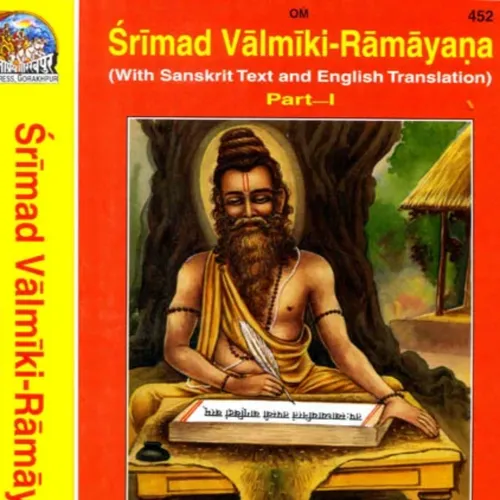
Śrīmad Vālmīki Rāmāyana (English Translation)
As part of our online Satsang (https://www.facebook.com/profile.php?id=61551067569493) we are reading the Gita Press English Translation, these episodes are recordings from those Satsangs. We were listening to another podcast reading this version that stopped at Aranyakānda Canto 40, thus we start with Canto 41 . After finishing the Yuddhakānda we started from the beginning of the Bālakānda.
We dedicate our humble effort to the Almighty Lord Śrī Rāma, who has sustained us throughout in His abundant grace and enabled us to continue this podcast.
- Update frequency
- every 2 days
- Average duration
- 10 minutes
- Episodes
- 432
- Years Active
- 2024 - 2025

Bālakānda - Canto 53
Heartily entertained alongwith his army by Vasistha with delicious foods and drinks yielded by his cow of plenty, Viśwāmitra asks of him the cow, which Vasistha declines to part with.

Bālakānda - Canto 52
Vasistha enjoins his cow of plenty, Śabalā by name, to yield necessary articles for entertaining Viśwāmitra.

Bālakānda - Canto 51
At the request of ›atånanda, Viśwāmitra tells him how Ahalyā was redeemed by Śrī Rāma and entertained him with the help of her husband. And Śatānanda in his turn commences narrating to Śrī Rāma the s…

Bālakānda - Canto 50
Śrī Rāma and others reach Mithilā and are received in advance by King Janaka, headed by his family priest, Śatānanda; Viśwāmitra satisfies their curiosity about the two princes of Ayodhyā.

Bālakānda - Canto 49
At the intercession of the gods, Indra is supplied with testicles of a ram; Ahalyaā gets back her pristine celestial form at the very sight of Śrī Rāma, the moment he enters the hermitage, and the tw…

Bālakānda - Canto 48
Having stayed overnight at Viśālā as an honoured guest of Sumati,Śrī Rāma, accompanied by Viśwāmitra and the other sages, heads towards Mithilā (the capital of King Janaka) and, on reaching on the wa…

Bālakānda - Canto 47
Viśwāmitra tells Śrī Rāma how on the very site of the grove where Diti practised her austerities, Vi‹åla, a son of Ikswāku, built the city of Viśālā. Sumati, the contemporary ruler of Viśālā, receive…

Bālakānda - Canto 46
Disconsolate over the death of her sons, Diti embarks on a course of austerities at Kuśaplava with the permission of her husband, Sage Kaśyapa, with the object of securing a son capable of killing In…

Bālakānda - Canto 45
Viśwāmitra tells Śrī Rāma how in the remote past the gods and the demons conjointly churned the ocean of milk, using Mount Mandara as the churning rod, how Lord ›iva drank off the deadly poison skimm…

Bālakānda - Canto 44
Applauding Bhagīratha, Brahmā urges him to gratify the souls of his departed great grand-uncles by offering them the water of the Gangā, and after doing his bidding, Bhagīratha returns to his capital…

Bālakānda - Canto 43
Pleased with the asceticism of Bhagīratha, Lord Śiva receives the Gangā on His head and discharges it into Bindusarovara. Branching forth into seven streams it then accompanies Bhagīratha to Rasātala…

Bālakānda - Canto 42
Amśumān and his grandson, Bhagīratha, successively practise austerities for bringing down the Gangā to the terrestrial plane. Brahmā grants a boon to Bhagīratha and exhorts him to propitiate Lord Śiv…

Bālakānda - Canto 41
Under orders of Sagara his grandson Amśumān proceeds to Rasātala through the underground passage made by his uncles and, bringing back the sacrificial horse, tells the king about the fate of his uncl…

Bālakānda - Canto 40
Brahmā reassures the gods by telling them that the sons of Sagara will be destroyed by the curse of Sage Kapila. The sons of Sagara in the course of their excavation arrive in the presence of Kapila …

Bālakānda - Canto 39
Indra steals away the horse released by Sagara as a prelude to his horse-sacrifice; his sixty thousand sons proceed to excavate the earth in quest of the horse and the gods in terror apprise Brahmā o…

Bālakānda - Canto 38
The narrative of King Sagara, a former king of Ayodhyā and a forefather of Śrī Rāma.

Bālakānda - Canto 37
A detailed account of Kārtikeya’s birth through Gangā.

Bālakānda - Canto 36
Gods interrupt the amorous pastimes of Lord Śiva and His Consort, Goddess Umā, on which She curses gods, including Mother Earth.

Bālakānda - Canto 35
Crossing the Sona, Viśwāmitra and party reach the bank of the holy Gangā and spend the night there. Requested by Śrī Rāma, he narrates the story of the origin of the Gangā.

Bālakānda - Canto 34
Kuśanābha performs a sacrifice for the birth of a son and is blessed with one, Gādhi by name; the glory of the river Kauśikī (the modern Kosi in Bihar).